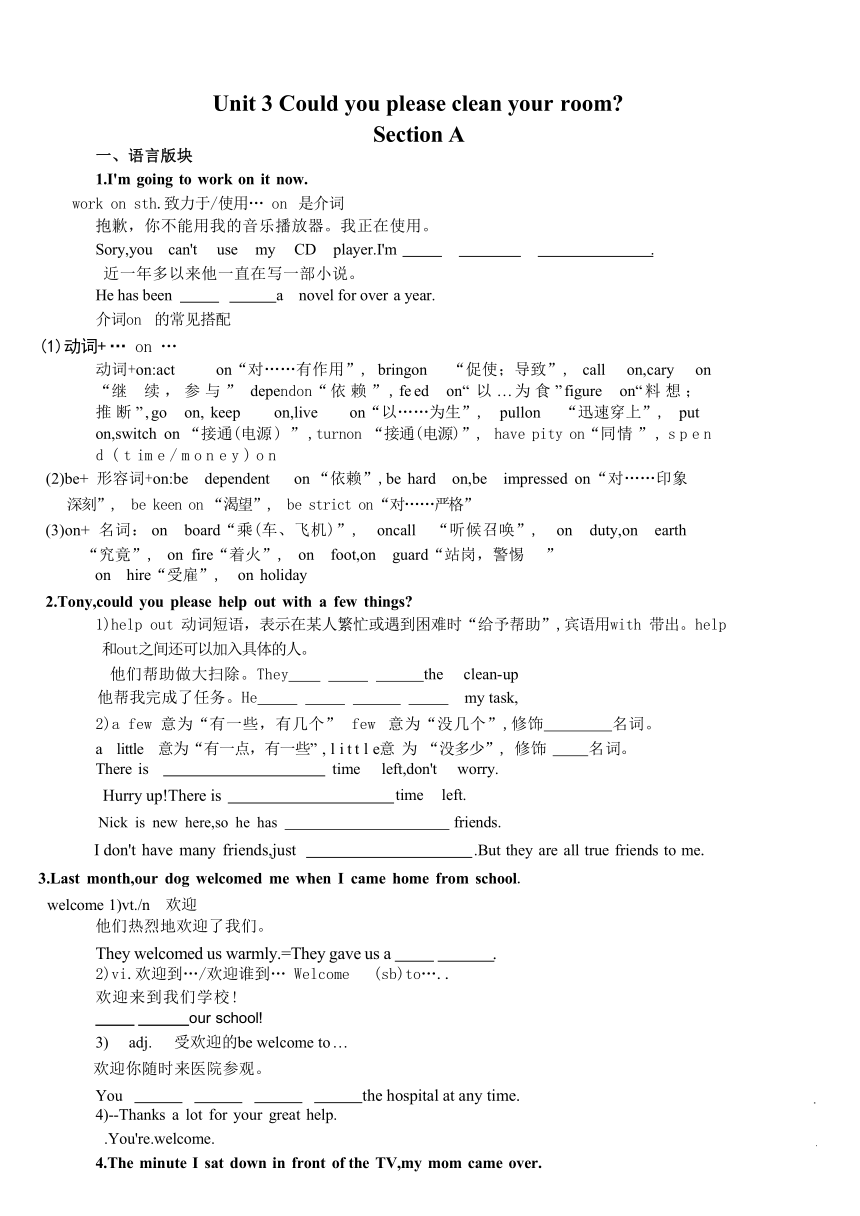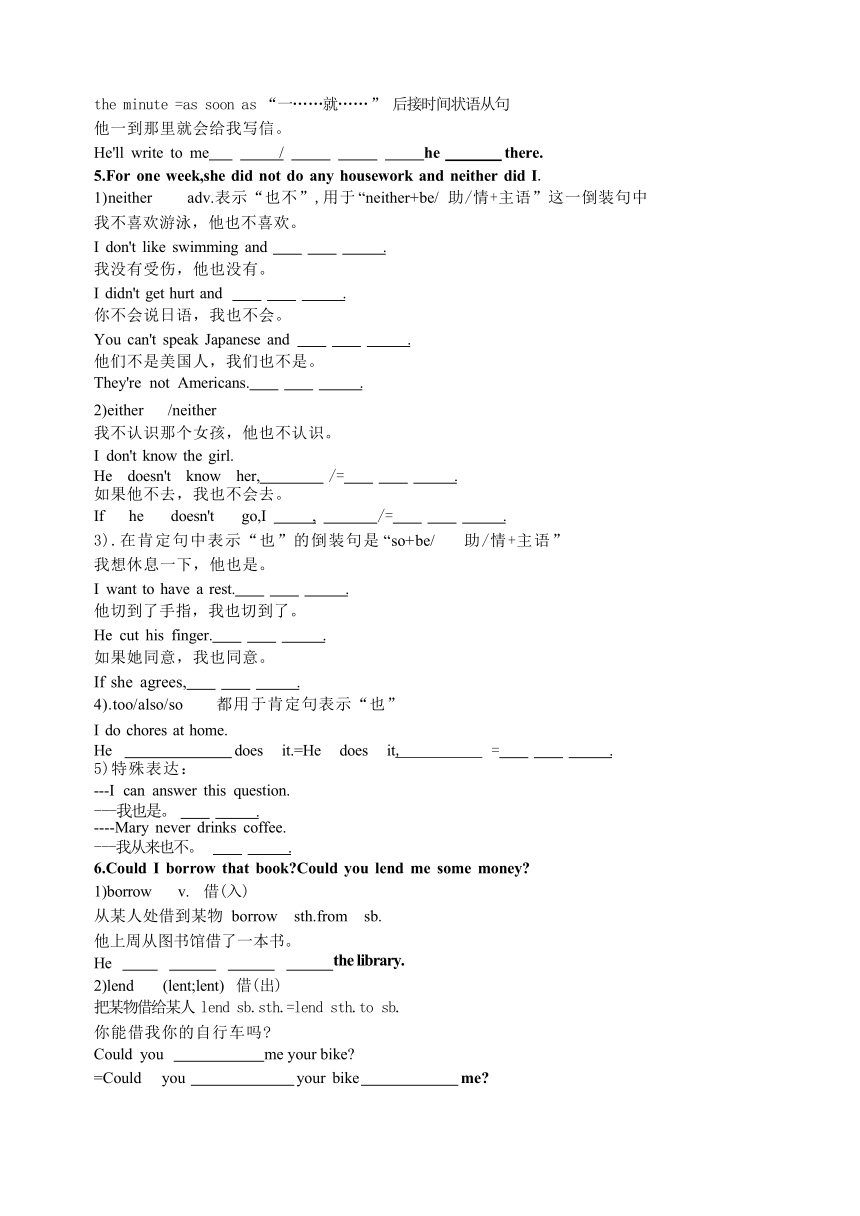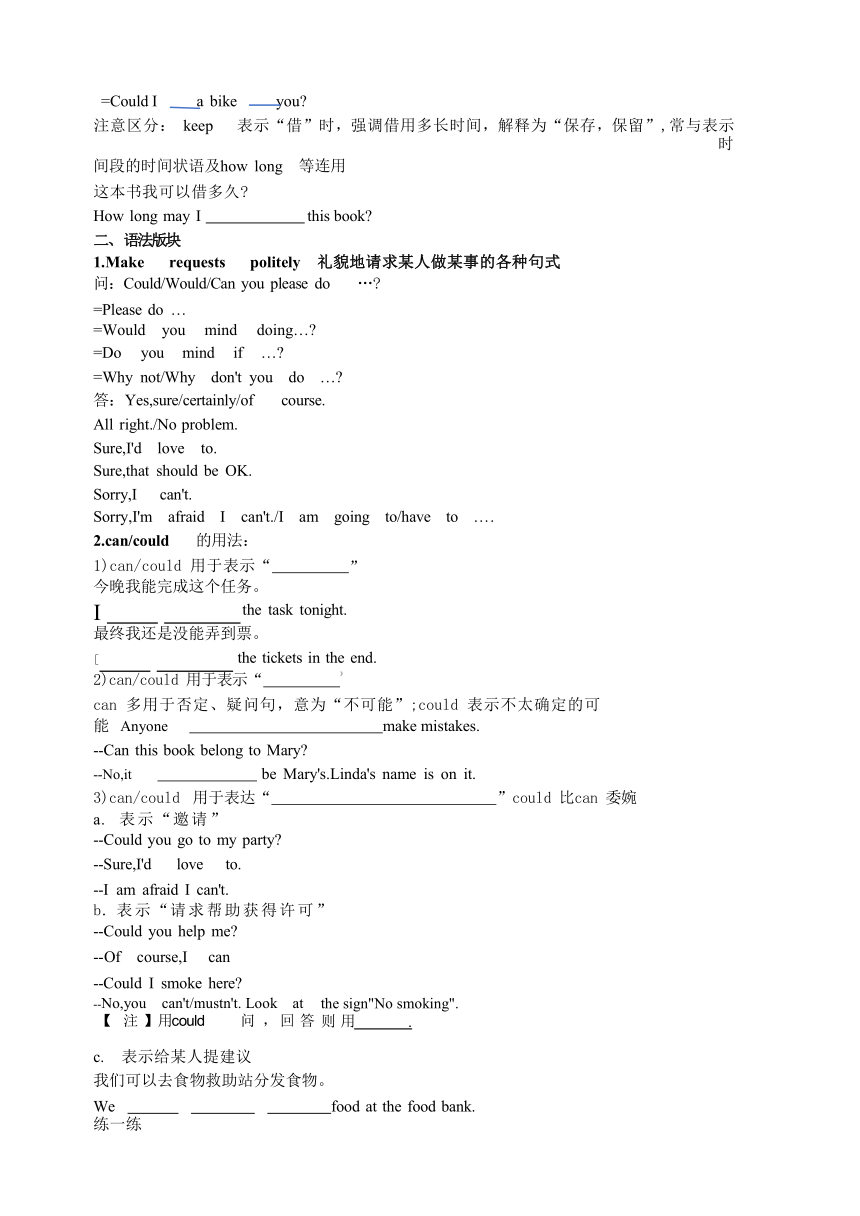Unit 3 Could you please clean your room? 知识点讲解+练习(无答案) 人教版八年级英语下册
文档属性
| 名称 | Unit 3 Could you please clean your room? 知识点讲解+练习(无答案) 人教版八年级英语下册 |

|
|
| 格式 | docx | ||
| 文件大小 | 57.2KB | ||
| 资源类型 | 教案 | ||
| 版本资源 | 人教新目标(Go for it)版 | ||
| 科目 | 英语 | ||
| 更新时间 | 2024-06-28 00:00:00 | ||
图片预览



文档简介
Unit 3 Could you please clean your room
Section A
一、语言版块
1.I'm going to work on it now.
work on sth.致力于/使用… on 是介词
抱歉,你不能用我的音乐播放器。我正在使用。
Sory,you can't use my CD player.I'm .
近一年多以来他一直在写一部小说。
He has been a novel for over a year.
介词on 的常见搭配
(1)动词+ … on …
动词+on:act on“对……有作用”, bringon “促使;导致”, call on,cary on “继 续,参与” dependon“依赖”,fe ed on“ 以 …为食”figure on“料想;推断”,go on, keep on,live on“以……为生”, pullon “迅速穿上”, put on,switch on “接通(电源 ) ” ,turnon “接通(电源)”, have pity on“ 同 情 ” , s p e n d ( t im e / m o n e y ) o n
(2)be+ 形容词+on:be dependent on “依赖”,be hard on,be impressed on “对……印象
深刻”, be keen on “渴望”, be strict on “对……严格”
(3)on+ 名词: on board“乘(车、飞机)”, oncall “听候召唤”, on duty,on earth
“究竟”, on fire“着火”, on foot,on guard“站岗,警惕 ” on hire“受雇”, on holiday
2.Tony,could you please help out with a few things
1)help out 动词短语,表示在某人繁忙或遇到困难时“给予帮助”,宾语用with 带出。help
和out之间还可以加入具体的人。
他们帮助做大扫除。They the clean-up
他帮我完成了任务。He my task,
2)a few 意为“有一些,有几个” few 意为“没几个”,修饰 名词。
a little 意为“有一点,有一些” , l i t t l e意 为 “没多少”, 修 饰 名 词。 There is time left,don't worry.
Hurry up!There is time left.
Nick is new here,so he has friends.
I don't have many friends,just .But they are all true friends to me.
3.Last month,our dog welcomed me when I came home from school.
welcome 1)vt./n 欢迎 他们热烈地欢迎了我们。
They welcomed us warmly.=They gave us a . 2)vi.欢迎到…/欢迎谁到… Welcome (sb)to…..
欢迎来到我们学校!
our school!
adj. 受欢迎的be welcome to …
欢迎你随时来医院参观。
You the hospital at any time. 4)--Thanks a lot for your great help.
.You're.welcome.
4.The minute I sat down in front of the TV,my mom came over.
the minute =as soon as “一……就…… ” 后接时间状语从句
他一到那里就会给我写信。
He'll write to me / he there.
5.For one week,she did not do any housework and neither did I.
1)neither adv.表示“也不”,用于 “neither+be/ 助/情+主语”这一倒装句中
我不喜欢游泳,他也不喜欢。
I don't like swimming and .
我没有受伤,他也没有。
I didn't get hurt and .
你不会说日语,我也不会。
You can't speak Japanese and .
他们不是美国人,我们也不是。
They're not Americans. .
2)either /neither
我不认识那个女孩,他也不认识。
I don't know the girl.
He doesn't know her, /= .
如果他不去,我也不会去。
If he doesn't go,I , /= .
3).在肯定句中表示“也”的倒装句是 “so+be/ 助/情+主语”
我想休息一下,他也是。
I want to have a rest. .
他切到了手指,我也切到了。
He cut his finger. .
如果她同意,我也同意。
If she agrees, .
4).too/also/so 都用于肯定句表示“也”
I do chores at home.
He does it.=He does it, = .
5)特殊表达:
---I can answer this question.
---我也是。 .
----Mary never drinks coffee.
---我从来也不。 .
6.Could I borrow that book Could you lend me some money
1)borrow v. 借(入)
从某人处借到某物 borrow sth.from sb.
他上周从图书馆借了一本书。
He the library.
2)lend (lent;lent) 借(出)
把某物借给某人 lend sb.sth.=lend sth.to sb.
你能借我你的自行车吗
Could you me your bike
=Could you your bike me
=Could I a bike you
注意区分: keep 表示“借”时,强调借用多长时间,解释为“保存,保留”,常与表示时
间段的时间状语及how long 等连用
这本书我可以借多久
How long may I this book
二、 语法版块
1.Make requests politely 礼貌地请求某人做某事的各种句式
问: Could/Would/Can you please do …
=Please do …
=Would you mind doing…
=Do you mind if …
=Why not/Why don't you do …
答: Yes,sure/certainly/of course.
All right./No problem.
Sure,I'd love to.
Sure,that should be OK.
Sorry,I can't.
Sorry,I'm afraid I can't./I am going to/have to … .
2.can/could 的用法:
1)can/could 用于表示“ ”
今晚我能完成这个任务。
I the task tonight.
最终我还是没能弄到票。
[ the tickets in the end.
2)can/could 用于表示“ 》
can 多用于否定、疑问句,意为“不可能”;could 表示不太确定的可能 Anyone make mistakes.
--Can this book belong to Mary
--No,it be Mary's.Linda's name is on it.
3)can/could 用于表达“ ”could 比can 委婉 a. 表示“邀请”
--Could you go to my party
--Sure,I'd love to.
--I am afraid I can't.
b. 表示“请求帮助获得许可”
--Could you help me
--Of course,I can
--Could I smoke here
--No,you can't/mustn't. Look at
【 注 】 用could 问 , 回 答
the sign"No smoking".
则 用 .
c. 表示给某人提建议
我们可以去食物救助站分发食物。
We food at the food bank.
练一练
1) (can)you swim when you were 8
2)— (can)I use your bike —Sorry,you
3)Mr.Smith be at school.He left for Shanghai this morning.
4)You give away your old books to poor children.
5)He be in his office just now.I saw him playing soccer on the playground.
Section B
1.Housework is a waste of their time.
1)waste n. 浪费
做…是浪费时间/金钱 Sth/Doing …is a waste of(one’s)time/money
=It's a waste of (one's)time/money doing … … .
买没有用的东西是浪费钱的事情。
useless things is money.
= a waste of money _useless things.
2)waste vt. 浪费 反义词: save
不要浪费食物!
!
waste time /money on sth./doing sth.
他浪费了许多时间玩电脑游戏。
He computer games.
3)waste adj. 无用的,废弃的
废水/废纸/荒地waste / /land
2.They should spend their time on schoolwork in order to get good grades and get into a
good university.
1)spend(spent)v. 花费
sb.spend st/sm on sth.; sb.spend st/sm(in)doing sth =It takes sb st.to do sth. 用spend 和take 的正确形式填空:
1.She 50 dollars the skirt.
2.It them half an hour (get)there
3.Mario five years (write)the book.
注意: pay 大多指花钱,其主语往往是付钱的人,后面紧跟钱的表达,所买的东西前常用
for 来连接,即: sb.+pay+money+for sth.
cost 也大多指花钱,其主语往往是所买的东西,后面紧跟付钱的人,然后紧跟钱的表达,
即: sth.+cost+sb.+money
他花了一万美金买车。
He ten thousand dollars the car.
=The car him ten thousand dollars.
2)in orderto 意为“为了…”表目的=to …=so that…=in order that…
为了节约时间,他在公交车上吃早餐。
, he eats breakfast on the bus.
=He eats breakfast on the bus .
=He eats breakfast on the bus he can .
=He eats breakfast on the bus he can . 为了不迟到,她五点就出发了
be late,she started at five o'clock.
3.So there is no need for them to do it now.
没有必要做某事There is no need (for sb)to do …
=It's not necessary (for sb)to do …
=…don't need to do …
=…needn't do …
他没必要再待在这儿。
to stay here any more. = to stay here any more.
=He here any more.
=He here any more.
4.It's the parents'job to provide a clean and comfortable environment at home for their children.
1)Itis one's job(duty)to do sth 做某事是某人的工作(职责)
把东西给学生讲明白是每一位老师应做的事情。
It's explain things clearly to the students.
2)provide v. 提供过去式 现在分词
给某人提供某物provide sth.for sb.=provide sb.with sth.
为了保护环境,超市不为顾客提供免费塑料袋。
To protect the environment,supermarkets don't free plastic bags customers.
=To protect the environment,supermarkets don't customers free plastic bags.
5.Children these days depend on their parents too much.
depend on 依靠,依赖
不要太过依赖于你的父母。
your parents too much.
你的梦想依赖于它。
Your dream .
【拓展】It all depends./That depends. 视情况而定
一 Can you come to the party tomorrow —It all depends.
6.Since they live in one house with their parents,they should know that everyone should do
their part in keeping it clean and tidy.
1)since conj.因为,既然(表示对方已知的事实或理由,常放在句首)
既然我们没有钱,就不能买车。
we have ,we can't buy a car.
由于我不怎么懂日语,我听不懂他们说什么。
I knew Japanese,I didn't understand their conversation.
【拓展】since 还有“自从”的意思,主句用完成时。
自从他来到重庆就一直在这家公司工作。
he Chongqing,he has worked in this company.
2)do one's part in doing sth. 尽某人的职责做某事
我们应该尽我们的责任保护环境。
We should protecting the environment.
【比较】play a part in(doing)sth. 参与……中(并发挥作用)、对……有影响
他渴望能参与到中国的发展中。
He looked forward to China's development
7.As a result,he often fell ill and his grades dropped.
1)as a result 结果,因此
雨下得太大,结果我们不得不推迟计划。
It rains really hard. we have to our plan
注意:区别as a result 为副词用法,意为“结果是”,后面指事情的结果;
as a result of 为短语介词,后跟名词、代词等,意为“由于…的原因”相当于 because of; 由于大雨的缘故主,火车晚点了。
The train was delayed the heavy rain.
2)fall (过去式: )link v.系动词 入睡 fall 生病 fall
vi.落下,摔倒
那棵树像要倒下了。
The tree is going to
我摔倒了,划破了膝盖。
I and cut my knee.
3)drop (过去式: 现在分词: )
vt./vi. 扔,掉下,落下
He the glass on the floor.
The glass on the floor and broke
从……落下 drop ffrom = fall off=fall down from
男孩从自行车上掉下来摔伤了。
The boy the bike and got hurt.
=The boy the bike and got hurt.
=The boy the bike and got hurt.
vt. 放弃
Don't drop math.=Don't math.
n. 水滴
几滴雨 of rain
【fall 和drop 区别】fall 多指无意识的行为,有自然坠落之意,且是不及物动词。
drop 即可指无意的行为,也可指有意的行为,可做及物动词。
Leaves in autumn. He the vase(花瓶)angrily.
8.The earlier kids learn to be independent,the better it is for their future.
the +比较级, the+比较级“越……就越……”
他解释得越多,我们就理解得越透彻。
he explained, we understood.
很多人相信一个人书读得越多就会变得越聪明。
Many people believe that a person reads, he will become.
你越努力,你取得的进步就越大。
you work, you'll make.
二、佳句仿写
1.The minute I sat down in front of the TV,my mom came over.我一坐到电视机前面,我 妈妈就过来了,
美句翻译: 学习是从人一出生那一刻就开始了的。
Learning begins a man is born.
佳句原创:
2.It's not enough to get good grades at school.仅仅是在学校取得好的成绩是不够的。 美句翻译:当你伤了别人的心,仅仅道歉是不够的。
When you hurt one's heart, 佳句原创:
Section A
一、语言版块
1.I'm going to work on it now.
work on sth.致力于/使用… on 是介词
抱歉,你不能用我的音乐播放器。我正在使用。
Sory,you can't use my CD player.I'm .
近一年多以来他一直在写一部小说。
He has been a novel for over a year.
介词on 的常见搭配
(1)动词+ … on …
动词+on:act on“对……有作用”, bringon “促使;导致”, call on,cary on “继 续,参与” dependon“依赖”,fe ed on“ 以 …为食”figure on“料想;推断”,go on, keep on,live on“以……为生”, pullon “迅速穿上”, put on,switch on “接通(电源 ) ” ,turnon “接通(电源)”, have pity on“ 同 情 ” , s p e n d ( t im e / m o n e y ) o n
(2)be+ 形容词+on:be dependent on “依赖”,be hard on,be impressed on “对……印象
深刻”, be keen on “渴望”, be strict on “对……严格”
(3)on+ 名词: on board“乘(车、飞机)”, oncall “听候召唤”, on duty,on earth
“究竟”, on fire“着火”, on foot,on guard“站岗,警惕 ” on hire“受雇”, on holiday
2.Tony,could you please help out with a few things
1)help out 动词短语,表示在某人繁忙或遇到困难时“给予帮助”,宾语用with 带出。help
和out之间还可以加入具体的人。
他们帮助做大扫除。They the clean-up
他帮我完成了任务。He my task,
2)a few 意为“有一些,有几个” few 意为“没几个”,修饰 名词。
a little 意为“有一点,有一些” , l i t t l e意 为 “没多少”, 修 饰 名 词。 There is time left,don't worry.
Hurry up!There is time left.
Nick is new here,so he has friends.
I don't have many friends,just .But they are all true friends to me.
3.Last month,our dog welcomed me when I came home from school.
welcome 1)vt./n 欢迎 他们热烈地欢迎了我们。
They welcomed us warmly.=They gave us a . 2)vi.欢迎到…/欢迎谁到… Welcome (sb)to…..
欢迎来到我们学校!
our school!
adj. 受欢迎的be welcome to …
欢迎你随时来医院参观。
You the hospital at any time. 4)--Thanks a lot for your great help.
.You're.welcome.
4.The minute I sat down in front of the TV,my mom came over.
the minute =as soon as “一……就…… ” 后接时间状语从句
他一到那里就会给我写信。
He'll write to me / he there.
5.For one week,she did not do any housework and neither did I.
1)neither adv.表示“也不”,用于 “neither+be/ 助/情+主语”这一倒装句中
我不喜欢游泳,他也不喜欢。
I don't like swimming and .
我没有受伤,他也没有。
I didn't get hurt and .
你不会说日语,我也不会。
You can't speak Japanese and .
他们不是美国人,我们也不是。
They're not Americans. .
2)either /neither
我不认识那个女孩,他也不认识。
I don't know the girl.
He doesn't know her, /= .
如果他不去,我也不会去。
If he doesn't go,I , /= .
3).在肯定句中表示“也”的倒装句是 “so+be/ 助/情+主语”
我想休息一下,他也是。
I want to have a rest. .
他切到了手指,我也切到了。
He cut his finger. .
如果她同意,我也同意。
If she agrees, .
4).too/also/so 都用于肯定句表示“也”
I do chores at home.
He does it.=He does it, = .
5)特殊表达:
---I can answer this question.
---我也是。 .
----Mary never drinks coffee.
---我从来也不。 .
6.Could I borrow that book Could you lend me some money
1)borrow v. 借(入)
从某人处借到某物 borrow sth.from sb.
他上周从图书馆借了一本书。
He the library.
2)lend (lent;lent) 借(出)
把某物借给某人 lend sb.sth.=lend sth.to sb.
你能借我你的自行车吗
Could you me your bike
=Could you your bike me
=Could I a bike you
注意区分: keep 表示“借”时,强调借用多长时间,解释为“保存,保留”,常与表示时
间段的时间状语及how long 等连用
这本书我可以借多久
How long may I this book
二、 语法版块
1.Make requests politely 礼貌地请求某人做某事的各种句式
问: Could/Would/Can you please do …
=Please do …
=Would you mind doing…
=Do you mind if …
=Why not/Why don't you do …
答: Yes,sure/certainly/of course.
All right./No problem.
Sure,I'd love to.
Sure,that should be OK.
Sorry,I can't.
Sorry,I'm afraid I can't./I am going to/have to … .
2.can/could 的用法:
1)can/could 用于表示“ ”
今晚我能完成这个任务。
I the task tonight.
最终我还是没能弄到票。
[ the tickets in the end.
2)can/could 用于表示“ 》
can 多用于否定、疑问句,意为“不可能”;could 表示不太确定的可能 Anyone make mistakes.
--Can this book belong to Mary
--No,it be Mary's.Linda's name is on it.
3)can/could 用于表达“ ”could 比can 委婉 a. 表示“邀请”
--Could you go to my party
--Sure,I'd love to.
--I am afraid I can't.
b. 表示“请求帮助获得许可”
--Could you help me
--Of course,I can
--Could I smoke here
--No,you can't/mustn't. Look at
【 注 】 用could 问 , 回 答
the sign"No smoking".
则 用 .
c. 表示给某人提建议
我们可以去食物救助站分发食物。
We food at the food bank.
练一练
1) (can)you swim when you were 8
2)— (can)I use your bike —Sorry,you
3)Mr.Smith be at school.He left for Shanghai this morning.
4)You give away your old books to poor children.
5)He be in his office just now.I saw him playing soccer on the playground.
Section B
1.Housework is a waste of their time.
1)waste n. 浪费
做…是浪费时间/金钱 Sth/Doing …is a waste of(one’s)time/money
=It's a waste of (one's)time/money doing … … .
买没有用的东西是浪费钱的事情。
useless things is money.
= a waste of money _useless things.
2)waste vt. 浪费 反义词: save
不要浪费食物!
!
waste time /money on sth./doing sth.
他浪费了许多时间玩电脑游戏。
He computer games.
3)waste adj. 无用的,废弃的
废水/废纸/荒地waste / /land
2.They should spend their time on schoolwork in order to get good grades and get into a
good university.
1)spend(spent)v. 花费
sb.spend st/sm on sth.; sb.spend st/sm(in)doing sth =It takes sb st.to do sth. 用spend 和take 的正确形式填空:
1.She 50 dollars the skirt.
2.It them half an hour (get)there
3.Mario five years (write)the book.
注意: pay 大多指花钱,其主语往往是付钱的人,后面紧跟钱的表达,所买的东西前常用
for 来连接,即: sb.+pay+money+for sth.
cost 也大多指花钱,其主语往往是所买的东西,后面紧跟付钱的人,然后紧跟钱的表达,
即: sth.+cost+sb.+money
他花了一万美金买车。
He ten thousand dollars the car.
=The car him ten thousand dollars.
2)in orderto 意为“为了…”表目的=to …=so that…=in order that…
为了节约时间,他在公交车上吃早餐。
, he eats breakfast on the bus.
=He eats breakfast on the bus .
=He eats breakfast on the bus he can .
=He eats breakfast on the bus he can . 为了不迟到,她五点就出发了
be late,she started at five o'clock.
3.So there is no need for them to do it now.
没有必要做某事There is no need (for sb)to do …
=It's not necessary (for sb)to do …
=…don't need to do …
=…needn't do …
他没必要再待在这儿。
to stay here any more. = to stay here any more.
=He here any more.
=He here any more.
4.It's the parents'job to provide a clean and comfortable environment at home for their children.
1)Itis one's job(duty)to do sth 做某事是某人的工作(职责)
把东西给学生讲明白是每一位老师应做的事情。
It's explain things clearly to the students.
2)provide v. 提供过去式 现在分词
给某人提供某物provide sth.for sb.=provide sb.with sth.
为了保护环境,超市不为顾客提供免费塑料袋。
To protect the environment,supermarkets don't free plastic bags customers.
=To protect the environment,supermarkets don't customers free plastic bags.
5.Children these days depend on their parents too much.
depend on 依靠,依赖
不要太过依赖于你的父母。
your parents too much.
你的梦想依赖于它。
Your dream .
【拓展】It all depends./That depends. 视情况而定
一 Can you come to the party tomorrow —It all depends.
6.Since they live in one house with their parents,they should know that everyone should do
their part in keeping it clean and tidy.
1)since conj.因为,既然(表示对方已知的事实或理由,常放在句首)
既然我们没有钱,就不能买车。
we have ,we can't buy a car.
由于我不怎么懂日语,我听不懂他们说什么。
I knew Japanese,I didn't understand their conversation.
【拓展】since 还有“自从”的意思,主句用完成时。
自从他来到重庆就一直在这家公司工作。
he Chongqing,he has worked in this company.
2)do one's part in doing sth. 尽某人的职责做某事
我们应该尽我们的责任保护环境。
We should protecting the environment.
【比较】play a part in(doing)sth. 参与……中(并发挥作用)、对……有影响
他渴望能参与到中国的发展中。
He looked forward to China's development
7.As a result,he often fell ill and his grades dropped.
1)as a result 结果,因此
雨下得太大,结果我们不得不推迟计划。
It rains really hard. we have to our plan
注意:区别as a result 为副词用法,意为“结果是”,后面指事情的结果;
as a result of 为短语介词,后跟名词、代词等,意为“由于…的原因”相当于 because of; 由于大雨的缘故主,火车晚点了。
The train was delayed the heavy rain.
2)fall (过去式: )link v.系动词 入睡 fall 生病 fall
vi.落下,摔倒
那棵树像要倒下了。
The tree is going to
我摔倒了,划破了膝盖。
I and cut my knee.
3)drop (过去式: 现在分词: )
vt./vi. 扔,掉下,落下
He the glass on the floor.
The glass on the floor and broke
从……落下 drop ffrom = fall off=fall down from
男孩从自行车上掉下来摔伤了。
The boy the bike and got hurt.
=The boy the bike and got hurt.
=The boy the bike and got hurt.
vt. 放弃
Don't drop math.=Don't math.
n. 水滴
几滴雨 of rain
【fall 和drop 区别】fall 多指无意识的行为,有自然坠落之意,且是不及物动词。
drop 即可指无意的行为,也可指有意的行为,可做及物动词。
Leaves in autumn. He the vase(花瓶)angrily.
8.The earlier kids learn to be independent,the better it is for their future.
the +比较级, the+比较级“越……就越……”
他解释得越多,我们就理解得越透彻。
he explained, we understood.
很多人相信一个人书读得越多就会变得越聪明。
Many people believe that a person reads, he will become.
你越努力,你取得的进步就越大。
you work, you'll make.
二、佳句仿写
1.The minute I sat down in front of the TV,my mom came over.我一坐到电视机前面,我 妈妈就过来了,
美句翻译: 学习是从人一出生那一刻就开始了的。
Learning begins a man is born.
佳句原创:
2.It's not enough to get good grades at school.仅仅是在学校取得好的成绩是不够的。 美句翻译:当你伤了别人的心,仅仅道歉是不够的。
When you hurt one's heart, 佳句原创:
同课章节目录
- Unit 1 What's the matter?
- Section A
- Section B
- Unit 2 I'll help to clean up the city parks.
- Section A
- Section B
- Unit 3 Could you please clean your room?
- Section A
- Section B
- Unit 4 Why don't you talk to your parents?
- Section A
- Section B
- Unit 5 What were you doing when the rainstorm came
- Section A
- Section B
- Review of Units 1-5
- Unit 6 An old man tried to move the mountains.
- Section A
- Section B
- Unit 7 What's the highest mountain in the world?
- Section A
- Section B
- Unit 8 Have you read Treasure Island yet?
- Section A
- Section B
- Unit 9 Have you ever been to a museum?
- Section A
- Section B
- Unit 10 I've had this bike for three years.
- Section A
- Section B
